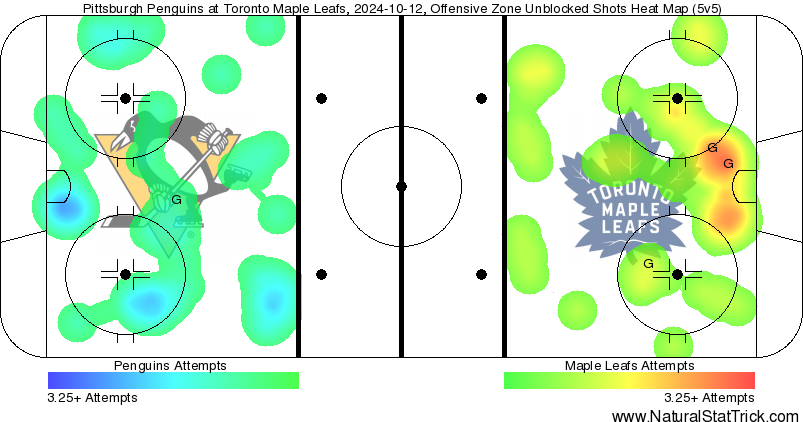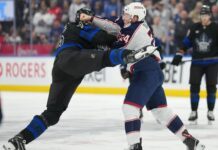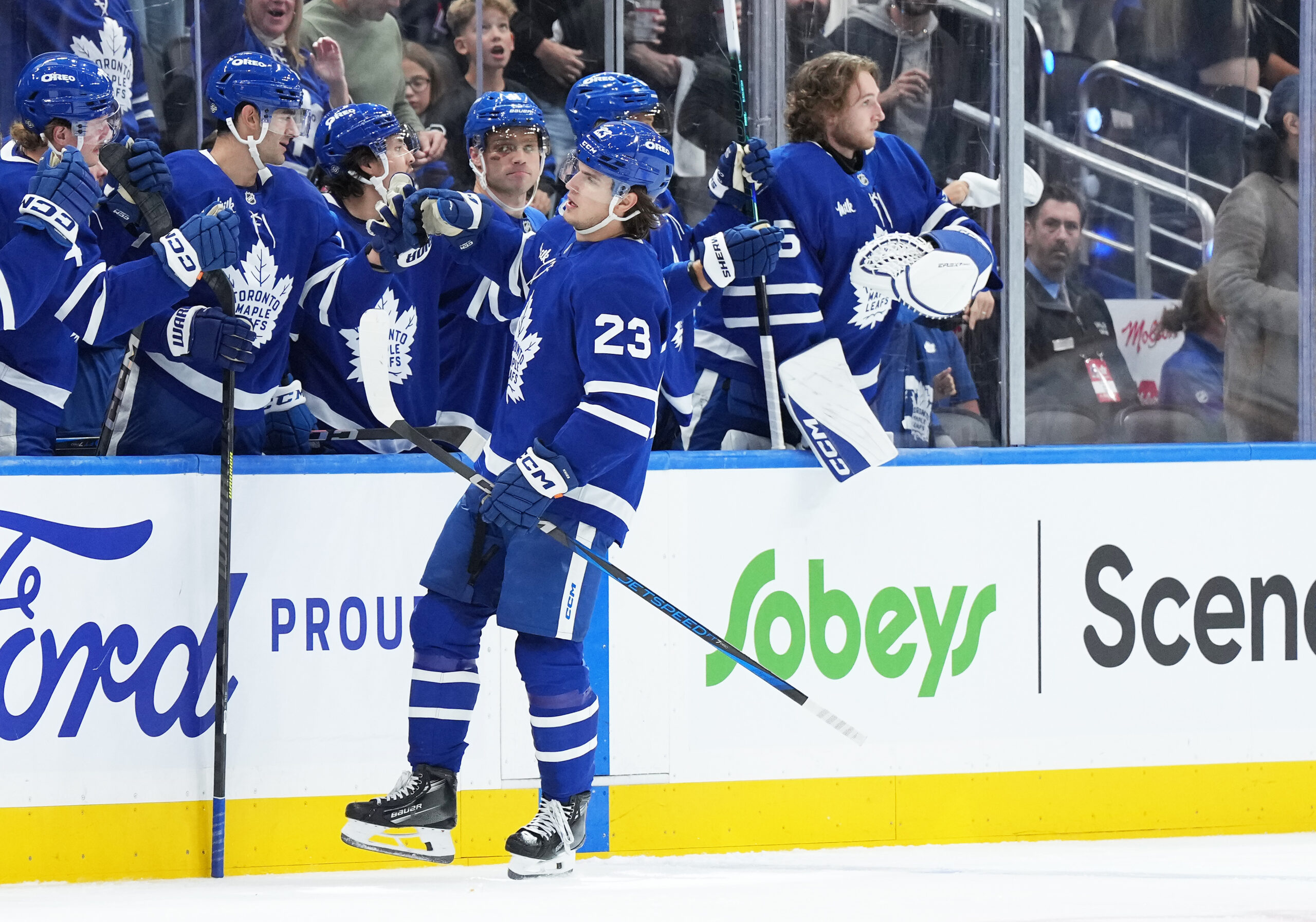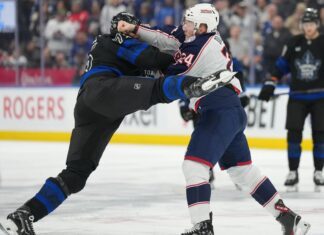co-written by Alec Brownscombe & Anthony Petrielli
It wasn’t the first period the Maple Leafs and their fans were looking for in the home opener, but all’s well that ends well as the team recovered to take home the two points without John Tavares in the lineup.
While special teams remain a work in progress, the Leafs‘ goaltending depth is so far standing up to the early test without Joseph Woll, the revamped defense unit continues to look solid overall, and two of the Leafs‘ star forwards (William Nylander and Mitch Marner) broke through with their first goals of the season to move the Leafs to 2-1-0 through three games.
Your game in 10:
1. The SBA wasn’t exactly a fortress last season, and oftentimes, the Leafs didn’t come out and impose their will/dictate the play to the opposition on home ice. Despite the home-opening festivities, they really didn’t start fast or show much emotion in their play in this one. The top line (with the Morgan Rielly-Chris Tanev pairing) lined up across from Sidney Crosby’s line, Auston Matthews lost the opening draw, and the Penguins got to work establishing their forecheck for much of the first 10 minutes. The Leafs were a step slow and sloppy with the puck under pressure.
One notable pushback shift came from the makeshift Bobby McMann — Pontus Holmberg — William Nylander line after Ryan Graves fell in his own zone and turned the puck over. They sustained 66 seconds of pressure, wherein the Leafs were able to bring a fresh change onto the ice during the extended offensive-zone sequence.
There was one great chance in front for Holmberg off of a Nylander feed, and it is notable that Holmberg has had a few good looks already this season without ever truly threatening the goaltender. He’s done some good things to get into those positions, but the shot often leaves a lot to be desired — there is not any zip on it, and it’s something he needs to put the work into developing/improving. You can’t play in an NHL top-nine if you can’t cash in around the net at a decent enough clip.
Overall, it was the Leafs’ worst period of the young season — outshot 10-6 at 5v5, out-chanced 10-5, and shot attempts were 23-16 in Pittsburgh’s favour. They did avoid giving up many grade-As, though, with decent composure/structure in their own zone after turning over pucks.
2. The Leafs were settling into the game somewhat when an errant David Kampf pass in the offensive zone put Simon Benoit in a tough spot defending Cody Glass on a fast break the other way. To his credit, Benoit recovered and kept up well enough to make a nice diving play in which he seemed to check Glass’ stick, but the referees called it a trip (two minutes for defending too well!).
Coming out of a TV timeout, Holmberg won the initial draw for a clearance, and his faceoff performance is noteworthy so far — it was a weakness in the past, but he’s won seven of 12 shorthanded and 54% overall (tiny sample, granted). However, after the Penguins re-entered the zone, Holmberg made one of the more bizarre mistakes you’ll see this season from a PKer, turning the wrong way in anticipation of a pass that never came, stumbling over his own feet, and continuing to skate in the wrong direction, seemingly unaware/very slow to realize where the puck was. With a bunch of open ice in front of him, Kris Letang took a couple of strides in and ripped a perfect full-wind-up slapshot over Anthony Stolarz’s shoulder.
Once again, the Leafs’ PK settled in after conceding an early goal, but this pattern of spotting the opposition a goal per game in the first period remains a troubling theme in the early going. At least, in this case, the issue wasn’t structural or because of a lack of aggression — more of a strange individual mistake — and the PK was pretty sharp the rest of the way.
3. Late in the first period, the Leafs almost caught the Penguins on a bad change where Oliver Ekman-Larsson (off to an impressive start in a Leafs jersey) made a nice quick-up pass to Auston Matthews, who broke in on a partial breakaway.
It was sort of foreshadowing what was to come, as the Leafs caught the Penguins on a change in the first minute of the second period to tie the game. A total gift created a 2-on-0; a line change, combined with a broken stick (for Evgeni Malkin), combined with a whiff by Matt Grzelcyk on a backward pass in the neutral zone, sent Domi and Nylander in alone.
Craig Berube made the change at the intermission to swap Domi and Holmberg, which meant Nylander and Domi jumped over the boards at the same time as all of this was developing. It was the perfect confluence of events for the Leafs. They executed the 2-on-0 nicely, and Nylander tied the game with his first of the season.
"AN ABSOLUTE BEAUTIFUL GIFT-WRAPPED PASS!"
Nylander 1st of the Season vs Penguins courtesy of @Bonsie1951 and @Jim_Ralph. @LeafsJelly pic.twitter.com/4g1mqqxh4A
— Maple Leafs Hotstove (@LeafsNews) October 13, 2024
4. Just a couple of minutes later, the Leafs were leading.
Matthew Knies was rewarded for doing a bunch of small things well at both ends of the rink throughout the shift. He backchecked hard and ran Bryan Rust off the puck in the first place to recover possession in his own zone. After Mitch Marner dumped the puck in, he closed fast on the forecheck and bumped Noel Acciari hard before he could make a play on the rimmed puck on the half-wall, allowing the Leafs to establish possession in the zone. Knies immediately went to the front of the net, beating his man off the wall and benefitting from a bounce off the boards from a Morgan Rielly area shot pass.
Knies bore down really well on his shot, getting down on one knee and ripping it into the far top corner. He had a somewhat similar opportunity to start the season against Montreal but couldn’t get enough wood on it. Not this time, though. The goalie had no chance.
Knies 1st of the Season vs Penguins courtesy of @Bonsie1951 and @Jim_Ralph. @LeafsJelly pic.twitter.com/aUBpZPmMnV
— Maple Leafs Hotstove (@LeafsNews) October 13, 2024
5. The goal showed off everything that makes Knies’ package of tools/skill set so intriguing and valuable; he’s big, really strong, fast, developing into an all-situations player, and can finish plays to boot. Berube shifted him into Max Pacioretty’s place on the top PP unit in Tavares’ absence by the third period and also trusted him at 6-on-5 with a one-goal lead.
After the game, Berube mentioned the phrases “plays the right way” and “structured” about his game, which is high praise for an inexperienced player. We’ve already seen clear signs in the past two playoff runs that Knies’ game translates about as well as you’d expect when the games matter most.
Getting out ahead of a contract extension (as rumoured) makes a lot of sense, but is there a price that makes sense for the Leafs that Knies would actually sign vs. betting on himself at this stage in his career?
6. Holmberg and Domi weren’t the only players that swapped positions, as eventually, McMann and Robertson did as well, giving Robertson a top-six role. That essentially never happened under Sheldon Keefe and is a well-earned promotion for Robertson, who had a stronger camp and has worked to make plays over others who have played more minutes than him so far. While he couldn’t finish, Robertson drew a penalty in the third period (which helped preserve the lead), and he had a net drive in the second that opened up space for Nylander to cut in on his backhand (he put it off the mask).
Part of the reason Robertson moved up, presumably, is because Bobby McMann took a goaltender interference penalty off the rush. On the one hand, he’s driving the net hard, and you want to see plenty of that from him. On the other, he can’t lose control and skate into the goalie. McMann moved down to the third line afterward with Pacioretty and Holmberg, and right away, Pacioretty took an offensive zone penalty. Berube didn’t like either penalty by his team — he admitted after the game he only thought one call on Simon Benoit was weak — and he barely played after as well.
Berube didn’t just have a quick trigger finger on those above-mentioned players. He also demoted Holmberg on the penalty kill, and David Kampf moved up. The Leafs were using Matthews – Marner to start penalty kills — another reason the penalty kill settled down as it was an upgrade over Holmberg on this night.
7. The vibes weren’t great after another failed Leafs power play early in the third. Then Mitch Marner put his stamp on the young season after a quiet first two games.
Bryan Rust let the puck go on the rim, thinking he’d leave it for his defenseman, and Marner anticipated/read it really well, swooping in to intercept it and putting Marcus Pettersson in a bad spot. Marner torched him and finished well into the far side of the net. That’s a goal we have seen him score countless times, streaking down the wing and going far blocker. He did it against Boston and Ottawa last season, as just two examples, and it was also how he scored his first-ever NHL goal (also vs. the Bruins).
This was a big goal for the Leafs in the game to pad the lead and also a big goal for Marner individually. There is a lot of scrutiny on #16 entering the new season, and if the slow (very early) start (pointless in the first two) grew into something more, it would’ve been really noisy really quickly in the market.
The line isn’t really firing on all cylinders, and it more broke through with a few individual moments tonight than any sort of dominant performance as a unit, but it’s important to get the stars feeling good early in the year – Marner, in particular.
"That was a bullet"
Marner 1st of the Season vs Penguins courtesy of @Bonsie1951 and @Jim_Ralph. @LeafsJelly pic.twitter.com/EcZOw2DFVX
— Maple Leafs Hotstove (@LeafsNews) October 13, 2024
8. A few minutes after scoring, the Leafs took another bad penalty; this time, it was Simon Benoit helping the Penguins linger around in the game. It was Benoit’s second penalty of the night and fourth of the season, and apparently, Berube saw enough because Benoit was benched the rest of the night.
Matthews and Marner started the kill, followed by Kampf and Lorentz. While the Penguins created zone time, the Leafs did a good job of closing lanes and forcing the puck to the perimeter.
After the kill, there was a run of 5v5 play where the Leafs were generally in control and hardly threatened. But with seven and a half minutes left, the Penguins closed to within one as L4 (Lorentz – Kampf – Reaves) was caught out against the Malkin line, and Malkin made a great play on a chip out up the wall by OEL, gloving it down and bursting into the zone.
OEL didn’t seem to get the puck as high as he wanted, and Lorentz — who was releasing — wasn’t ready for it. Kampf, who was supporting, didn’t close after Malkin burst through. Both OEL and Conor Timmins were caught flat-footed for the ensuing 2v2 rush, which caused problems. OEL twisted the wrong way and struggled to recover, while Timmins maintained a bad gap following the turnover; he wasn’t able to recover and close the space, which gave Rakell enough time to get a shot off that went top corner.
9. With the score at 3-2, the Leafs went to a power play of their own with an opportunity to restore the two-goal lead and all but close the game. Changes were made to the top unit as OEL was bumped up to run the point, and Knies was used in front of the net.
They controlled play better on this power play compared to earlier opportunities, but they only put two shots toward the net, one of which was a shot pass deflection from Marner to Matthews in the slot. The other was an OEL shot attempt from the point that missed the net.
It is a good example of why the power play is struggling right now. There was a lot of purposeless puck movement on the point, and seemingly nobody wanted to shoot. We already mentioned this in the very first game in 10 of the season, but Matthews does not shoot nearly enough on the power play relative to his talent level. You would never guess he’s the best goal scorer in the world based on the power play’s tendencies right now; they don’t tee him up at all, and he’s not even hunting for his shot.
After the failed power play, the Penguins had time for a late push. Anthony Stolarz stood tall on a few goalmouth scrambles (and survived getting run by Evgeny Malkin). Jake McCabe came on at around the 1:55 mark and never left the ice again, playing RD with OEL and then LD with Tanev. At forward, Lorentz moved up to play with Matthews and Marner, while the Leafs also used a makeshift line of Knies – Domi – Nylander that ended up scoring the empty net goal (via Nylander’s second of the game/season).
10. Through three games, the Leafs are 2-1-0 with two regulation wins (remember when RW were a talking point to start last season?), and they should probably be 3-0-0 if we’re honest. That said, this was their worst game of the season so far.
The Penguins came out and controlled play for much of the first period. Berube noted they were under siege but didn’t give up much. While that’s true, shouldn’t the expectation be set at the home team — in its home opener — hunting their opponent down rather than being the hunted?
This was the Leafs’ worst game of the season in terms of controlling play, but they got some breaks/nice individual moments and also benefited from the Penguins’ overall lack of quality (they simply aren’t a very good team).
Anthony Stolarz remained a stabilizing force in his second start, which is huge given the worst has already happened with Joseph Woll (not even skating yet), and the defense unit is gelling nicely. Tanev and OEL are both playing like bona fide top-four defensemen, to go along with McCabe and Rielly. Picking up points while not playing your best is a sign of a good team, and this is a good team.
Game Flow: 5v5 Shot Attempts
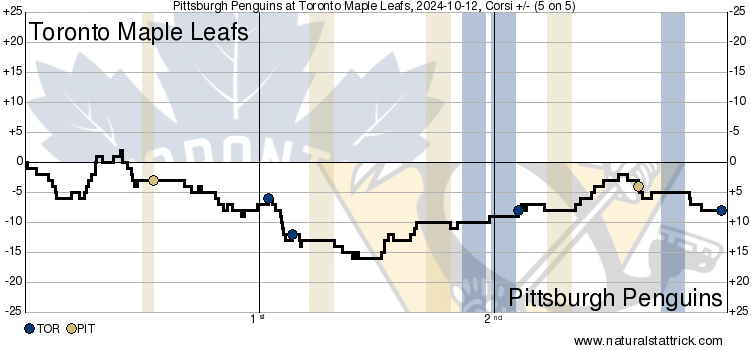
Heat Map: 5v5 Shot Attempts
